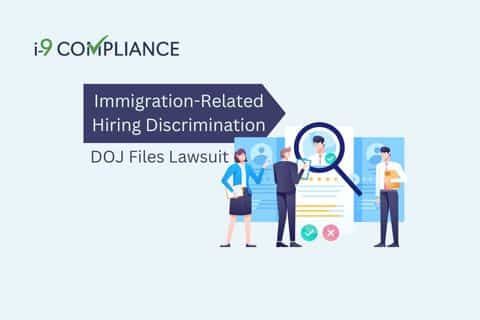DOJ Files Lawsuit Over Alleged Immigration-Related Hiring Discrimination

September 05, 2023
The Department of Justice (DOJ) recently filed a lawsuit against a major space technology company. This suit addressed alleged immigration discrimination against refugees and asylum recipients. According to the DOJ, the employer wrongfully claimed that the export control laws prohibited hiring anyone other than U.S. Citizens and lawful permanent residents.
According to the assistant attorney general for the DOJ’s Civil Rights division, “Our investigation found that [the employer] failed to fairly consider or hire asylees and refugees because of their citizenship status and imposed what amounted to a ban on their hire regardless of their qualification, in violation of federal law.”
The DOJ’s investigation began in June 2020 in response to a complaint it received earlier in the same year. According to the case, an employer asked about the lawful permanent resident’s citizenship status. This line of questioning occurred during an interview for a position in the company.
The DOJ also revealed that the company posted job openings and released public statements proving this issue. Over several years, these acts revealed the company’s stance about hiring only U.S. citizens and lawful permanent residents due to export control laws. Export control laws and regulations limit whom an employer may disclose restricted items.
Examples of these laws include the International Traffic in Arms Regulations and the Export Administration Regulations. These require employers to verify workers as “U.S. persons” or people with special authorization to receive export-controlled items, such as information.
Under these laws, a “U.S. person” includes U.S. citizens, lawful permanent residents, refugees, and asylees. The Immigration and Nationality Act (INA) prohibits employers from discriminating against an individual’s immigration status, citizenship, or national origin. As such, employers cannot base their hiring, firing, or recruiting decisions on this protected information.
Compliant employers must perform an export compliance assessment on applicants or employees. However, this assessment is often mistakenly incorporated into the employment eligibility verification (Form I-9) process. According to the laws, employers must complete these processes separately when required to fill out Form I-9s.
In response to these issues, the DOJ released a guide for employers explaining how to avoid discrimination when performing these processes. According to the lawsuit, the employer hired U.S. citizens and lawful permanent residents only between September 2018 and September 2020. The case also claims that the company refused to hire qualified asylees and refugees due to their citizenship status.
As a result, the DOJ will seek civil penalties, back pay, and other relief for affected applicants. The Department also intends to order a cease-and-desist against the employer, demanding they do not repeat the above practices in the future. This lawsuit illustrates how challenging compliance with employment eligibility requirements can become, especially for the I-9 process.
The best way to ensure compliance is to incorporate an electronic I-9 management tool with E-Verify integration. This tool can guide employers through each step of the process. It also offers other features, including electronic storage and reminders when action is required.
Ensure compliance today by switching to an electronic I-9 management tool with I-9Compliance.